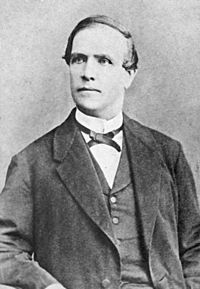Francisco Adolfo de Varnhagen, Viscount of Porto Seguro facts for kids
Quick facts for kids
Francisco Adolfo de Varnhagen
|
|
|---|---|
 |
|
| Born | February 17, 1816 Iperó, Brazil |
| Died | June 26, 1878 (aged 62) Vienna, Austria |
| Occupation | Military, diplomat, historian |
| Nationality | Brazilian |
| Alma mater | Colégio Militar |
| Notable works | História Geral do Brasil |
| Spouse | Carmen Ovalle y Vicuña |
| Relatives | Friedrich Ludwig Wilhelm Varnhagen |
Francisco Adolfo de Varnhagen (born February 17, 1816 – died June 26, 1878) was an important Brazilian diplomat and historian. A diplomat is someone who represents their country in other nations. A historian studies and writes about the past. He is often called "the father of modern Brazilian history writing" because of his detailed and careful work. He also holds a special place in the Brazilian Academy of Letters.
Contents
Early Life and Education
Francisco Adolfo de Varnhagen was born in 1816 in Iperó, Brazil. His father, Friedrich Ludwig Wilhelm Varnhagen, was a German military engineer. He worked for the Portuguese king and was in Brazil to check on iron factories.
Varnhagen started his schooling in Rio de Janeiro. When he was young, his family moved to Lisbon, Portugal. There, he studied at the Royal Military College. He even served in a civil war in Portugal, supporting Dom Pedro I.
After the war, he went back to his studies. He learned paleography, which is the study of old handwriting. He also studied economics and several languages, including French, German, and English.
Discoveries and Diplomatic Career
Between 1835 and 1838, Varnhagen wrote his first history book, Notícia do Brasil. His research led him to an amazing discovery. He found the long-lost grave of Pedro Álvares Cabral in a church in Portugal. Cabral was the Portuguese explorer who first arrived in Brazil.
Varnhagen became a member of the Sciences Academy of Lisbon. He also finished his studies in military engineering. In 1840, he returned to Brazil. He joined the Brazilian Historic and Geographic Institute in 1841.
In 1844, Varnhagen became a Brazilian citizen. This allowed him to start a career as a diplomat. He worked in many countries, including Portugal and Spain. In Spain, he used old archives to find information for his history of Brazil.
He also served in Paraguay, Venezuela, Colombia, Ecuador, Chile, Peru, and the Netherlands. While in Chile, he met and married Doña Carmen Ovalle y Vicuña in 1864.
His Main Work: História Geral do Brasil
Varnhagen's most important work was his book, História Geral do Brasil (General History of Brazil). The first part of this book was published in 1854. The second part came out in 1857. This book is still considered a very important work on Brazilian history.
In 1872, Emperor Pedro II gave him the special title of Baron of Porto Seguro. Two years later, he was given an even higher title, Viscount. His last job as a diplomat was in Vienna, Austria. He was serving there when he passed away in 1878.
His body was first taken to Santiago, Chile. Years later, his remains were moved to a monument built in his honor in Sorocaba, Brazil.
His Views on History
Varnhagen's historical writings were highly respected. Even famous scientists like Alexander von Humboldt admired his work. Varnhagen also took part in important discussions about Brazil's history.
He had strong opinions about the role of Indigenous people in Brazil's past. He believed they could not be seen as the "masters" of Brazil. He also thought they needed outside help to become civilized.
Varnhagen generally supported the idea of a monarchy (a country ruled by a king or emperor). He felt it gave Brazil a strong central government. He also tended to side with the Portuguese colonists in debates about the colonial period.
He had mixed feelings about the Jesuits (a group of Catholic priests) in Brazil. He gave them credit for some good contributions. He also thought the Dutch occupation of Brazil's northeast, though difficult, brought some benefits because the Dutch were "active and industrious."
Main Works
- Notícia do Brasil (1839)
- Épicos Brasileiros (1843)
- Amador Bueno (1847)
- Trovas e Cantares de um Códice do Século XVI (1849)
- Florilégio da Poesia Brasileira (1850)
- História Geral do Brasil (1854–1857)
- Sumé (1855)
See also
 In Spanish: Francisco Adolfo de Varnhagen para niños
In Spanish: Francisco Adolfo de Varnhagen para niños
 | Jessica Watkins |
 | Robert Henry Lawrence Jr. |
 | Mae Jemison |
 | Sian Proctor |
 | Guion Bluford |

